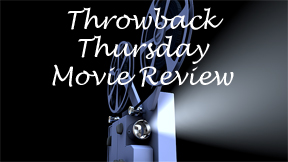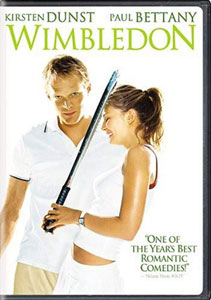Making a great fictional tennis movie is a tall order. The sport is naturally cinematic and filled with personal drama, and there’s no way made-up people and events can compete with what’s really happening on the pro tours. (By contrast, in a team sport like baseball or football, the idea of zeroing in on an individual has enough novelty value that even fictional people can be compelling.) Considering everything stacked against it, though, “Wimbledon” (2004) does not embarrass itself and is rather likable, if not memorable.
Impressive tennis action
Chronicling Peter Colt (Paul Bettany) and Lizzie Bradbury (Kirsten Dunst), “Wimbledon” would be laughed off the court if it came out today because the idea of a journeyman wild card winning the men’s tournament seems absurd after all these years of Federer and a few other elite players owning it. But in that small window between the Sampras and Federer eras, the idea wasn’t absurd (Goran Ivanisevic won as a wild card in 2001), and indeed, we’ve seen plenty of upstart women’s major champions in recent years.
So the broad narrative is grounded, and perhaps more importantly, the tennis action is good. There’s the occasional logistical moment where I thought “That’s not how it really goes in tennis” (Peter’s friendship with a specific ball boy, for example), but not as many as you’d assume.

“Wimbledon” (2004)
Director: Richard Loncraine
Writers: Adam Brooks, Jennifer Flackett, Mark Levin
Stars: Kirsten Dunst, Paul Bettany, Jon Favreau
“Wimbledon’s” special effects are impressive, as the actors made tennis motions without the ball, which was later inserted digitally (Check out the bonus feature if you have the DVD). I suspected a digital ball was used only because it’s obvious actors couldn’t have learned to play convincing high-level tennis, and even stunt doubles couldn’t choreograph tennis rallies with such specificity.
With the realism established, director Richard Loncraine’s “Wimbledon” lets us into something that the mainstream tennis media keeps a respectful distance from but which tabloids (in the countries that love tennis, such as the UK and Australia) sometimes touch on: players’ personal lives.
Good chemistry
There’s nothing groundbreaking about Peter and Lizzie’s fortnight romance, but Bettany and Dunst do have decent chemistry in the way of two attractive people. The conflict isn’t complex, even by rom-com standards; it’s about how both of them – especially Lizzie, since her dad, Dennis (Sam Neill), holds a tight leash – need to carefully map out their routine during the tournament.
Indeed, Dennis isn’t bothered that his daughter is dating an older man (Colt is 32, ancient by 2004 tennis standards, and Lizzie’s career is just starting). He’s bothered that she’ll be distracted from tennis.
It’s a dual-lead movie, but the team of three writers (two of whom, bizarrely, are “Big Mouth” co-creators Jennifer Flackett and Mark Levin) puts more of the inner tennis drama into Peter’s arc. He has to play his best friend and hitting partner in one round; he has to overcome a back injury in another. All the while, he weighs whether to quit.

We hear Peter’s internal monologues, and while these are heavy on sports clichés (“Don’t choke, don’t choke,” etc.), they ring true. The film mentions but doesn’t hype up the long Wimbledon title drought among British players (which Andy Murray ended in 2013 in the real world), perhaps out of respect for the actual historical fact.
Mild amusements
A few side plots are mildly amusing, such as Colt’s brother (a pre-stardom James McAvoy) always betting against Peter, the Colt parents re-bonding over their son’s success, and an uber-agent (Jon Favreau) juggling his many clients and monetizing them at the slightest opportunity.
As a tennis fan, it’s tempting to go into “Wimbledon” thinking it’ll be stupid, but it’s not off point in any major way. The tennis action and atmosphere are good, the romantic drama between a male and female player is something that could very well happen, and the screenplay checks the box of having one of the lovebirds point out that “Love means nothing in tennis.”
But between its down-the-middle portrayal of the sport and its formulaic romance, “Wimbledon” isn’t all that memorable. Real-world tennis has so many great characters and storylines – and that’s true more than ever now — that a made-up version can’t compete.

